 Listening to the anachronistic, neo-pagan German folk music ofWaldteufel, one would never suspect that it is the work of twoAmericans from Portland, Oregon. Normally, I would immediately dismissthis sort of pseudo-European posturing as laughable, but Waldteufelmanage to neatly sidestep all of the usual pitfalls that turn this kindof cultural co-opting into a joke. Surprisingly, Heimliches Deutschland(Hidden Germany), is an embarassment of riches: a sincere andbeautifully executed set of German "volkische" songs extolling Northernmyths, traditions and mysteries. Waldteufel is the duo of Annabel Leeand Markus Wolff, formerly a percussionist for post-industrialagitators Crash Worship. Wolff sings and beats hand drums, while Leerounds out the sound with violin, viola and accordion. There are somesubtle synthesizer flourishes and limited studio effects that help totransport the listener to the Wald Schwarzer (Black Forest) circa 1895.One can almost hear the crackling of the bonfire and the smell of wildboar roasting on the spit as Waldteufel play their revelatory paganhymns. Other Deutsch-obsessed industrial folksters like Death in Juneand Der Blutharsch would be far too cynical to produce music thisserious, subtle and lovely. Anyone who knows anything about late 19thcentury German history knows that it was a time of cultural rennaisanceand the birth of the "volkische" movement: a movement towards theabandonment of Christianity and an embrace of the ideals and purity ofthe Aryan tradition. This mythical heritage encompassed occultreligious practices, language, politics, and even music. It was thismovement that paved the way for the Thule and other undergroundright-wing groups that eventually brought Hitler and Nazis to power.Although Waldteufel hover dangerously close to this area, their musicis untainted by politics or historical revisionism. Markus Wolff writesmost of the tracks himself, but a few of the songs are new arrangementsof German folk songs from this golden age period. In "Neun Welten All"(The Nine Worlds), Wolff beats out a hand rhythm while his richbaritone is overdubbed with whispers, deep vocal drones, viola andflute. It's all a little messy and underproduced, a conscious aestheticchoice which lends credibility to this material. "Lichtkreuzweihe"(Consecration of the Luminous Cross) is such a deeply heroic ode toWotan's cross, I feel as if I'm there in a candle-lit Masonic lodge,where Runic magicians make communal music for nobody but themselves.The longest track, "Wotans Wilde Jagd" (Wotan's Wild Hunt), is also themost infectious. It begins with a sythesized horn fanfare that isimmediately reminiscent of Wendy Carlos' Mozart renditions for hersoundtrack to A Clockwork Orange. Multi-tracked vocals begin, with ahearty, catchy refrain worthy of a biergarten sing-along. The hauntingfinal track "Nachhall," (Reprise) is the strangest of all, aneffects-heavy revisit of "The Nine Worlds" that chops up and dubs outthe vocals and adds layers of reverb and echo. This is a fittinglyspectral end to what must be the most unique and unexpected "retro"albums to come along in quite some time.
Listening to the anachronistic, neo-pagan German folk music ofWaldteufel, one would never suspect that it is the work of twoAmericans from Portland, Oregon. Normally, I would immediately dismissthis sort of pseudo-European posturing as laughable, but Waldteufelmanage to neatly sidestep all of the usual pitfalls that turn this kindof cultural co-opting into a joke. Surprisingly, Heimliches Deutschland(Hidden Germany), is an embarassment of riches: a sincere andbeautifully executed set of German "volkische" songs extolling Northernmyths, traditions and mysteries. Waldteufel is the duo of Annabel Leeand Markus Wolff, formerly a percussionist for post-industrialagitators Crash Worship. Wolff sings and beats hand drums, while Leerounds out the sound with violin, viola and accordion. There are somesubtle synthesizer flourishes and limited studio effects that help totransport the listener to the Wald Schwarzer (Black Forest) circa 1895.One can almost hear the crackling of the bonfire and the smell of wildboar roasting on the spit as Waldteufel play their revelatory paganhymns. Other Deutsch-obsessed industrial folksters like Death in Juneand Der Blutharsch would be far too cynical to produce music thisserious, subtle and lovely. Anyone who knows anything about late 19thcentury German history knows that it was a time of cultural rennaisanceand the birth of the "volkische" movement: a movement towards theabandonment of Christianity and an embrace of the ideals and purity ofthe Aryan tradition. This mythical heritage encompassed occultreligious practices, language, politics, and even music. It was thismovement that paved the way for the Thule and other undergroundright-wing groups that eventually brought Hitler and Nazis to power.Although Waldteufel hover dangerously close to this area, their musicis untainted by politics or historical revisionism. Markus Wolff writesmost of the tracks himself, but a few of the songs are new arrangementsof German folk songs from this golden age period. In "Neun Welten All"(The Nine Worlds), Wolff beats out a hand rhythm while his richbaritone is overdubbed with whispers, deep vocal drones, viola andflute. It's all a little messy and underproduced, a conscious aestheticchoice which lends credibility to this material. "Lichtkreuzweihe"(Consecration of the Luminous Cross) is such a deeply heroic ode toWotan's cross, I feel as if I'm there in a candle-lit Masonic lodge,where Runic magicians make communal music for nobody but themselves.The longest track, "Wotans Wilde Jagd" (Wotan's Wild Hunt), is also themost infectious. It begins with a sythesized horn fanfare that isimmediately reminiscent of Wendy Carlos' Mozart renditions for hersoundtrack to A Clockwork Orange. Multi-tracked vocals begin, with ahearty, catchy refrain worthy of a biergarten sing-along. The hauntingfinal track "Nachhall," (Reprise) is the strangest of all, aneffects-heavy revisit of "The Nine Worlds" that chops up and dubs outthe vocals and adds layers of reverb and echo. This is a fittinglyspectral end to what must be the most unique and unexpected "retro"albums to come along in quite some time.
We made it to 700 episodes. While it's not a special episode per se—commemorating this milestone—you can pretty much assume that every episode is special. This one features Mark Spybey & Graham Lewis, Brian Gibson, Sote, Scanner and Neil Leonard, Susumu Yokota, Eleven Pond, Frédéric D. Oberland / Grégory Dargent / Tony Elieh / Wassim Halal, Yellow Swans, Dental waste in Saigon photo by Krisztian. Get involved: subscribe, review, rate, share with your friends, send images! |



 The comforting compositions of Jimmy LaValle and the spacious but densesounds of On Air Library make for the perfect alone-time listen orperhaps the soundtrack to time spent with a loved one. Everything onthis album is a whisper, a gentle breeze passing over my body. TheAlbum Leaf tracks are simple and cascading. Each song begins simplyenough and then each element begins to flow into another flawlessly; ariver of twinkling percussion and lullabies woven out of dream-stuff."Lamplight" is certainly a highlight. Its soft-as-a-pillow melodysounds like raindrops falling slowly onto a pond. On Air Library'smusic is just as beautiful and is a very exciting band for me. "Ex'sand Oh's" begins with distant voices and a guitar that reminds me of atropical beach somwhere at night. The mood is set wonderfully and "Passthe Mic" and "Faux Fromm" do not disappoint. Soft, bouncing guitars andscattered percussion combine in new and surprisingly fresh ways thatmake for a luscious and inviting listen. Vocals churn and distortionblossoms on "Faux Fromm," a stunning and shining song that makes mefeel as if I'm floating through the clouds and into the heavens. When Iclose my eyes and listen to this, I can't help but think of vacantwharehouses and dimly lit fields in the middle of nowhere. All thesongs fit together perfectly on this EP and the musicians here reallycompliment eachother. I am interested in The Album Leaf more afterhearing this and On Air Library is definitely a band to watch for; theyhave a full length album due out this fall that I cannot wait to hear.
The comforting compositions of Jimmy LaValle and the spacious but densesounds of On Air Library make for the perfect alone-time listen orperhaps the soundtrack to time spent with a loved one. Everything onthis album is a whisper, a gentle breeze passing over my body. TheAlbum Leaf tracks are simple and cascading. Each song begins simplyenough and then each element begins to flow into another flawlessly; ariver of twinkling percussion and lullabies woven out of dream-stuff."Lamplight" is certainly a highlight. Its soft-as-a-pillow melodysounds like raindrops falling slowly onto a pond. On Air Library'smusic is just as beautiful and is a very exciting band for me. "Ex'sand Oh's" begins with distant voices and a guitar that reminds me of atropical beach somwhere at night. The mood is set wonderfully and "Passthe Mic" and "Faux Fromm" do not disappoint. Soft, bouncing guitars andscattered percussion combine in new and surprisingly fresh ways thatmake for a luscious and inviting listen. Vocals churn and distortionblossoms on "Faux Fromm," a stunning and shining song that makes mefeel as if I'm floating through the clouds and into the heavens. When Iclose my eyes and listen to this, I can't help but think of vacantwharehouses and dimly lit fields in the middle of nowhere. All thesongs fit together perfectly on this EP and the musicians here reallycompliment eachother. I am interested in The Album Leaf more afterhearing this and On Air Library is definitely a band to watch for; theyhave a full length album due out this fall that I cannot wait to hear. Eluvium is Matthew Cooper's vehicle for submerging controlled dronesfrom his guitar and piano in water and letting them out in a ceruleansubmarine world. The entire timbre of the album is an exploration ofwhat music sounds like underwater. Yet few waves or currents jostle themusic's placidity; each song is eerily consistent, not changing verymuch over the course of its minutes (trickier than imaginable,considering one particular song exceeds 15 minutes). Eluvium songs onlyseem to change over the course of epochs, not eighth notes, but theresistance to change is disciplined, rather than lazy or shortsighted.Each song has the potential to explode or diverge, but instead remainson the easy river and explores a steady tack of controlled dissonancemixed with elegance. The album begins with "The Unfinished," whosesynthetic warbles are punctuated by a errant guitar line every now andthen. The warble returns in "Under the Water It Glowed," but now theguitar line is more prominent melodically. By this time, it seems thatEluvium's songs are slowed down by some sort of physical effect, likediffraction through water particles. Through the aquatic slowness, theguts of the song—or perhaps even its soul—are almost seen. "ThereWasn't Anything" is a straightforward piano dirge with some overlaidfield recordings of voices and conversations, followed by "Zerthis wasa Shivering Human Image," a sonorous epic which oscillates between twochords while the surrounding distortion ebbs and flows. Seemingly threethousand scratchy crescendos occur, filtered through a sediment ofstatic. It's one of those songs which causes you to exhale powerfullywhen it eventually ends, when the tension is finally laid slack. Thecandor of such Eluvium songs, ones which force a confrontation with thesong's guts, is startling. Comparisons to Brian Eno are hard to shrugoff for Eluvium, but they are not indictments. This music is of the EnoSchool (think Apollo: Atmospheres and Soundtracks) and Matthew Cooper would seem to be an Eno acolyte, but the songs are studied without being facsimiles. Lambent Materialis a fascinating listen, and when the last song, "I Am So Much More MeThat You Are Perfectly You," finally delivers the actual sounds ofwater and rain beneath the piano's melody, you are reminded that youcould have been drowning this whole time and not even noticed it.
Eluvium is Matthew Cooper's vehicle for submerging controlled dronesfrom his guitar and piano in water and letting them out in a ceruleansubmarine world. The entire timbre of the album is an exploration ofwhat music sounds like underwater. Yet few waves or currents jostle themusic's placidity; each song is eerily consistent, not changing verymuch over the course of its minutes (trickier than imaginable,considering one particular song exceeds 15 minutes). Eluvium songs onlyseem to change over the course of epochs, not eighth notes, but theresistance to change is disciplined, rather than lazy or shortsighted.Each song has the potential to explode or diverge, but instead remainson the easy river and explores a steady tack of controlled dissonancemixed with elegance. The album begins with "The Unfinished," whosesynthetic warbles are punctuated by a errant guitar line every now andthen. The warble returns in "Under the Water It Glowed," but now theguitar line is more prominent melodically. By this time, it seems thatEluvium's songs are slowed down by some sort of physical effect, likediffraction through water particles. Through the aquatic slowness, theguts of the song—or perhaps even its soul—are almost seen. "ThereWasn't Anything" is a straightforward piano dirge with some overlaidfield recordings of voices and conversations, followed by "Zerthis wasa Shivering Human Image," a sonorous epic which oscillates between twochords while the surrounding distortion ebbs and flows. Seemingly threethousand scratchy crescendos occur, filtered through a sediment ofstatic. It's one of those songs which causes you to exhale powerfullywhen it eventually ends, when the tension is finally laid slack. Thecandor of such Eluvium songs, ones which force a confrontation with thesong's guts, is startling. Comparisons to Brian Eno are hard to shrugoff for Eluvium, but they are not indictments. This music is of the EnoSchool (think Apollo: Atmospheres and Soundtracks) and Matthew Cooper would seem to be an Eno acolyte, but the songs are studied without being facsimiles. Lambent Materialis a fascinating listen, and when the last song, "I Am So Much More MeThat You Are Perfectly You," finally delivers the actual sounds ofwater and rain beneath the piano's melody, you are reminded that youcould have been drowning this whole time and not even noticed it. 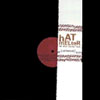 "Unknown" is a good way to describe this album. With the only providedinformation being the names of the four players, I'm able to listenwithout making any assumptions. The music sounds like very dynamicelectroacoustic improv, with quiet strings and digital mumbling givingway to noisy, highly textural crescendos. Things shift quickly anddon't fall back on familiar formulas. The strings and especiallypercussion are the most recognizable instruments, but there's a strongelectronic leaning. The tonal range of the group is so great that I wassurprised to learn that the lineup is two cellists and twopercussionists, as they're all capable of extracting a wide range ofsounds from their instruments, whether aided by electronics or not.This is one of the most consistently interesting improv albums I'veheard lately; for its entire length it really seems unknown,unpredictable, and utterly fascinating. The first of two sides has somecut-up, processed cello and some scraped acoustic strings in thebackground that develops with an amazing sense of cohesion as it shiftsgears into playing that sounds almost like chamber music, gentle buttense string interludes, and percussion-driven free playing. There's awealth of detail in this recording, both in the melodic features andburied beneath the surface in the sounds themselves. The sense of spaceis also well-captured; the second side begins with some stunning, slowcello textures and cymbal-heavy percussion that seems like it's comingfrom another room, heightening its mysterious beauty. That endsabruptly and they move onto other, busier-sounding concepts. This is avery impressive recording, and, as it's only available as a limited12", a good reason to own a turntable.
"Unknown" is a good way to describe this album. With the only providedinformation being the names of the four players, I'm able to listenwithout making any assumptions. The music sounds like very dynamicelectroacoustic improv, with quiet strings and digital mumbling givingway to noisy, highly textural crescendos. Things shift quickly anddon't fall back on familiar formulas. The strings and especiallypercussion are the most recognizable instruments, but there's a strongelectronic leaning. The tonal range of the group is so great that I wassurprised to learn that the lineup is two cellists and twopercussionists, as they're all capable of extracting a wide range ofsounds from their instruments, whether aided by electronics or not.This is one of the most consistently interesting improv albums I'veheard lately; for its entire length it really seems unknown,unpredictable, and utterly fascinating. The first of two sides has somecut-up, processed cello and some scraped acoustic strings in thebackground that develops with an amazing sense of cohesion as it shiftsgears into playing that sounds almost like chamber music, gentle buttense string interludes, and percussion-driven free playing. There's awealth of detail in this recording, both in the melodic features andburied beneath the surface in the sounds themselves. The sense of spaceis also well-captured; the second side begins with some stunning, slowcello textures and cymbal-heavy percussion that seems like it's comingfrom another room, heightening its mysterious beauty. That endsabruptly and they move onto other, busier-sounding concepts. This is avery impressive recording, and, as it's only available as a limited12", a good reason to own a turntable.  Steel-drum-led instrumentals give way to doo-wop laments about the woesand ways of love and foot-tapping jazz freak-outs glide into floweryaccordian pieces that somehow get me thinking about coffee, fine wines,and men in really cool, really dark sunglasses. I think it is safe tosay that Jeremy Jacobson's mind must be a mishmash of medievaltroubadours, pop stars, and drunken French lovers. All but one of thesongs are under three minutes—and most are under two—yet the music allgels together somehow. Perhaps this phenomenon has something to do withthe fact that Jacobson plays every instrument on every song (except fortwo) and sometimes plays them simultaneously. Forms and Folliesjumps from Motown to classically-arranged canons effortlessly andquickly without being too scatter-brained. The album, despite thenumerous influences it draws from, feels incredibly focused. When thesleepy, soft-as-a-pillow serenity of "Walking to Weston's" suddenlyflew into over-drive and "Who's to Say Your Soul's Not Carbon" rocketedthrough my ears, I only smiled and marveled at how well it all seemedto fit together and make perfect sense. The last four tracks are a purejoy to listen to and make for great night music (the sound of cricketsis the perfect accompaniment to these whimsical piano pieces). "NoPlace for My Kitten" is particularly incredible, however: heavilyprocessed vocals scratch and struggle to break free of their prisonwhile an almost remorseful accordian-led melody plays calmly andunsuspectingly over the top. My only gripe is that this album is justover thirty-two minutes long and when something sounds this good, Ialways want more.
Steel-drum-led instrumentals give way to doo-wop laments about the woesand ways of love and foot-tapping jazz freak-outs glide into floweryaccordian pieces that somehow get me thinking about coffee, fine wines,and men in really cool, really dark sunglasses. I think it is safe tosay that Jeremy Jacobson's mind must be a mishmash of medievaltroubadours, pop stars, and drunken French lovers. All but one of thesongs are under three minutes—and most are under two—yet the music allgels together somehow. Perhaps this phenomenon has something to do withthe fact that Jacobson plays every instrument on every song (except fortwo) and sometimes plays them simultaneously. Forms and Folliesjumps from Motown to classically-arranged canons effortlessly andquickly without being too scatter-brained. The album, despite thenumerous influences it draws from, feels incredibly focused. When thesleepy, soft-as-a-pillow serenity of "Walking to Weston's" suddenlyflew into over-drive and "Who's to Say Your Soul's Not Carbon" rocketedthrough my ears, I only smiled and marveled at how well it all seemedto fit together and make perfect sense. The last four tracks are a purejoy to listen to and make for great night music (the sound of cricketsis the perfect accompaniment to these whimsical piano pieces). "NoPlace for My Kitten" is particularly incredible, however: heavilyprocessed vocals scratch and struggle to break free of their prisonwhile an almost remorseful accordian-led melody plays calmly andunsuspectingly over the top. My only gripe is that this album is justover thirty-two minutes long and when something sounds this good, Ialways want more. 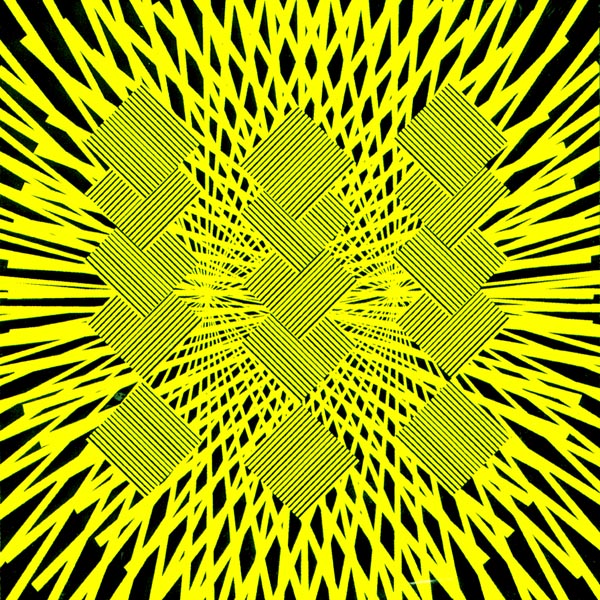 I've been calling this band Bang Bang Bang, but some of my friendsinsist on calling them Chik Chik Chik. According the pronunciationguide on the cover of this new two-track single, we're both right.However, I really prefer the way Bang Bang Bang sounds, and it kind ofrolls off the tongue in an exciting way. "Exciting" is they key wordfor !!!, whose vivid, energetic reinvisionment of early-80'sdance-influenced post-punk thrives on tense, ass-shaking grooves. Sincetheir 2000 debut, !!! have led the way for a whole crop of new bandsexploiting this sound, as well as a rediscovery of the original artistsand classic albums from the period that have been collecting dust fortwenty years. Their 'sister' band Out Hud, featuring some of the samemembers, upped the stakes even higher with the amazing album Street Dad,which concentrated on leftfield instrumental disco with a host ofbrilliant production flourishes. Hearing this new two-track CD singleby !!!, it is now unclear where !!! ends and Out Hud begins. Where!!!'s debut had a lean, guitar-driven sound not dissimiliar from Gangof Four, "Me and Giuliani Down By the Schoolyard" contains all of thedense, layered production that made Out Hud sound so unique. In fact,!!! now sound exactly like Out Hud with vocals. Whether this isindicative of a Parliament/Funkadelic kind of cross-pollenating bandrelationship is uncertain, but I have no complaints about the music,which is fantastic as ever. The title track is a nine-minute "truestory" that urges the stiff, Republican leadership of New York City tolose their inhibitions and "get on up & move it" to the music. Thevocals are buried and mostly inaudible, but it doesn't really matterbecause the beat is all you really care about. The bassline is an echoof ESG's "Erase You," and the production utilizes the whole repertoireof Out Hud's dub-influenced studio trickery to achieve the maximumgroove. Track two is an excellent remix of the song "Intensify" fromthe debut album. "Intensifieder Sunracappellectroshit Mix 03" riflesthrough the book of dub and early house production tricks to build anintensity that is far from gimmicky. The track is reduced to vocals,drums and bass, which are alternately echoed, delayed, layered andmutated. Stabs of synth and odd, CD-skip "hiccups" add to the eclecticdrama of the track. This is an awesome single. Can a new full-length befar behind?
I've been calling this band Bang Bang Bang, but some of my friendsinsist on calling them Chik Chik Chik. According the pronunciationguide on the cover of this new two-track single, we're both right.However, I really prefer the way Bang Bang Bang sounds, and it kind ofrolls off the tongue in an exciting way. "Exciting" is they key wordfor !!!, whose vivid, energetic reinvisionment of early-80'sdance-influenced post-punk thrives on tense, ass-shaking grooves. Sincetheir 2000 debut, !!! have led the way for a whole crop of new bandsexploiting this sound, as well as a rediscovery of the original artistsand classic albums from the period that have been collecting dust fortwenty years. Their 'sister' band Out Hud, featuring some of the samemembers, upped the stakes even higher with the amazing album Street Dad,which concentrated on leftfield instrumental disco with a host ofbrilliant production flourishes. Hearing this new two-track CD singleby !!!, it is now unclear where !!! ends and Out Hud begins. Where!!!'s debut had a lean, guitar-driven sound not dissimiliar from Gangof Four, "Me and Giuliani Down By the Schoolyard" contains all of thedense, layered production that made Out Hud sound so unique. In fact,!!! now sound exactly like Out Hud with vocals. Whether this isindicative of a Parliament/Funkadelic kind of cross-pollenating bandrelationship is uncertain, but I have no complaints about the music,which is fantastic as ever. The title track is a nine-minute "truestory" that urges the stiff, Republican leadership of New York City tolose their inhibitions and "get on up & move it" to the music. Thevocals are buried and mostly inaudible, but it doesn't really matterbecause the beat is all you really care about. The bassline is an echoof ESG's "Erase You," and the production utilizes the whole repertoireof Out Hud's dub-influenced studio trickery to achieve the maximumgroove. Track two is an excellent remix of the song "Intensify" fromthe debut album. "Intensifieder Sunracappellectroshit Mix 03" riflesthrough the book of dub and early house production tricks to build anintensity that is far from gimmicky. The track is reduced to vocals,drums and bass, which are alternately echoed, delayed, layered andmutated. Stabs of synth and odd, CD-skip "hiccups" add to the eclecticdrama of the track. This is an awesome single. Can a new full-length befar behind?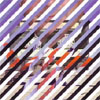 Originally recorded on May 21st, 2002, The War Against Terroris basically one 49-minute song, digitally indexed by six parts, allwhich flow without clear beginnings or endings. While the tune has arather angry feel, from its gritty and hurried pace, distorted dronesand evil synths, it's falls short of making a commentary due to thetiny number of spoken word samples, scarecly repeated throughout thetrack. Back in the old Cabaret Voltaire days, samples were firm andclear, whether it was "Do Right," "Don't Argue," or the brotherstalking on "Low Cool," as choices were made to reinterpret the darkworld sonically. With Kirk recordings as of late, the titles and textare strikingly colorful, but the message in the music itself iscertainly more grey.
Originally recorded on May 21st, 2002, The War Against Terroris basically one 49-minute song, digitally indexed by six parts, allwhich flow without clear beginnings or endings. While the tune has arather angry feel, from its gritty and hurried pace, distorted dronesand evil synths, it's falls short of making a commentary due to thetiny number of spoken word samples, scarecly repeated throughout thetrack. Back in the old Cabaret Voltaire days, samples were firm andclear, whether it was "Do Right," "Don't Argue," or the brotherstalking on "Low Cool," as choices were made to reinterpret the darkworld sonically. With Kirk recordings as of late, the titles and textare strikingly colorful, but the message in the music itself iscertainly more grey.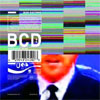 Bush Doctrine is Kirk's first release as BioChemical Dread, andis anxiously described as "an incendiary sonic polemic against oilygreed mongering and cultural ignorance," and looking at titles like"False King of the Earth," "King of Baghdad," "Where Is Mr. Sam?,""Zero Democracy Dub," and "I Got Weapons," that would make sense.Musically, this is probably one of the most challenging releases ofKirk's in a long time, threadding non-Western rhythms, wiry radiosamples, voices, wind instruments, and cutting things up into a heftybeat soup with tasty, buzzing noise elements. Kirk flip-flops aroundstyles from intense, high energy tunes to abrasive guitar-ish rockingtunes and slowed down dub numbers, delicately matching hypnotic, classybeats with strong melodies with ample noises. Listening to the tunesand -not- hearing vicious anti-war anti-government samples to match hisapparent sentiments is a let down, however, as I feel that thepackaging (with the song titles and a G. W. Bush cut up on the front)raises the levels of anticipation. I want attitude, I want guts, I wantto watch an accompanying set of visuals with things that will make mystomach turn. Perhaps I'll just have to play this album while watchingsomething awful like Fox News or listening to Democracy Now.
Bush Doctrine is Kirk's first release as BioChemical Dread, andis anxiously described as "an incendiary sonic polemic against oilygreed mongering and cultural ignorance," and looking at titles like"False King of the Earth," "King of Baghdad," "Where Is Mr. Sam?,""Zero Democracy Dub," and "I Got Weapons," that would make sense.Musically, this is probably one of the most challenging releases ofKirk's in a long time, threadding non-Western rhythms, wiry radiosamples, voices, wind instruments, and cutting things up into a heftybeat soup with tasty, buzzing noise elements. Kirk flip-flops aroundstyles from intense, high energy tunes to abrasive guitar-ish rockingtunes and slowed down dub numbers, delicately matching hypnotic, classybeats with strong melodies with ample noises. Listening to the tunesand -not- hearing vicious anti-war anti-government samples to match hisapparent sentiments is a let down, however, as I feel that thepackaging (with the song titles and a G. W. Bush cut up on the front)raises the levels of anticipation. I want attitude, I want guts, I wantto watch an accompanying set of visuals with things that will make mystomach turn. Perhaps I'll just have to play this album while watchingsomething awful like Fox News or listening to Democracy Now. Drone rock may not be understood by everyone, and it may induce sleepamong non-believers, but at least it has a sense of melody andmusicianship. Frequency Curtain, a project/experiment by Josh Rosen,John Grzinich and Rick Reed, is drone noise for the noise's sake. Usinganalogue and digital sine wave generators, shortwave radios, and laptopelectronics, the three became an experimental media performance groupthat first began displaying their wares at Intersect 4 in 2001.Improvisational sessions find the members powering up their devices andjust producing sound, tweaking and turning knobs on the fly to marry upthe various sounds produced by the devices. As such, I feel it shouldnot be judged on the quality or style of the sounds, but on the way thedevices interact with each other and the effect the whole performancehas on an audience. There are not many artists with this approach, andwith each that releases a recording of their work, I always feel likeI'm missing a component. This album was compiled from longer sessionsof improvisation, and I feel they probably work better with visualaccompaniment. The sounds that invade the speakers do not seem to bedesigned for listening alone, or at least not for listening enjoyment:they cause the hairs on the back of the neck to rise and fall with eachsquelch and high pitched squeak, and continually irritate the ears evenat low volume. But the different sound generators do blend togethernicely, and produce enough disparity to keep the listen interesting andvaried. The tracks do take quite a while to introduce a variation,however, and by that point many may lose interest. Like manyperformances, it can be summed up by asking Goethe's three questions:"What are they doing?"; "How are they doing it?"; and "Is it worthdoing?" The first two are answered above, and the third is a resounding"Yes." I just feel that it should never be presented in this format, asit loses a great deal of the punch.
Drone rock may not be understood by everyone, and it may induce sleepamong non-believers, but at least it has a sense of melody andmusicianship. Frequency Curtain, a project/experiment by Josh Rosen,John Grzinich and Rick Reed, is drone noise for the noise's sake. Usinganalogue and digital sine wave generators, shortwave radios, and laptopelectronics, the three became an experimental media performance groupthat first began displaying their wares at Intersect 4 in 2001.Improvisational sessions find the members powering up their devices andjust producing sound, tweaking and turning knobs on the fly to marry upthe various sounds produced by the devices. As such, I feel it shouldnot be judged on the quality or style of the sounds, but on the way thedevices interact with each other and the effect the whole performancehas on an audience. There are not many artists with this approach, andwith each that releases a recording of their work, I always feel likeI'm missing a component. This album was compiled from longer sessionsof improvisation, and I feel they probably work better with visualaccompaniment. The sounds that invade the speakers do not seem to bedesigned for listening alone, or at least not for listening enjoyment:they cause the hairs on the back of the neck to rise and fall with eachsquelch and high pitched squeak, and continually irritate the ears evenat low volume. But the different sound generators do blend togethernicely, and produce enough disparity to keep the listen interesting andvaried. The tracks do take quite a while to introduce a variation,however, and by that point many may lose interest. Like manyperformances, it can be summed up by asking Goethe's three questions:"What are they doing?"; "How are they doing it?"; and "Is it worthdoing?" The first two are answered above, and the third is a resounding"Yes." I just feel that it should never be presented in this format, asit loses a great deal of the punch. 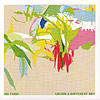 One of the great things about some modern pop musicians is theirability to draw from a wide variety of resources and references,carefully blending them together without becoming excessive. When donetastefully, a very interesting hybrid form of music that keeps with itsoriginal direction can be established to much delight. With Under A Different Sky,Chicago singer/songwriter Tania Bowers conveys her laid back popsensibilities approach with, at times, an electro-soul and jazz balladfeel for a rich forty minutes of listening pleasure. As a bass playerherself, Bowers has the fine drumming of John Herndon (Tortoise/A GrapeDope) fill out the rhythm section for the better part of the disc's tentracks while producer Casey Rice (Designer) augments with his signatureskills. Other notable guests include Doug McCombs, Noel Kupersmith,Howe Gelb and Scott Herren (Prefuse 73) providing their musicalsupport. Bowers' songwriting and soulful, sultry vocal style isperfectly suited throughout the varied musical scenes; the airy chordalprogressions of "I Dream Again," "Boltanski," and "Moonlight &Chaos," the dub-infused "In The Deep," and the country-tinged "True"are some of the highlights. The closest the disc gets to having an edgeis the distorted chugging riffage, guitar feedback and two-step beat of"The Rising," which at just over two minutes is all too brief. Foryears, Bowers has leant her vocals to recordings of various artists andprojects within the Chicago scene. Following Dream Of..., her debut EP as bandleader, Under A Different Sky should put her name on the musical map in good company.
One of the great things about some modern pop musicians is theirability to draw from a wide variety of resources and references,carefully blending them together without becoming excessive. When donetastefully, a very interesting hybrid form of music that keeps with itsoriginal direction can be established to much delight. With Under A Different Sky,Chicago singer/songwriter Tania Bowers conveys her laid back popsensibilities approach with, at times, an electro-soul and jazz balladfeel for a rich forty minutes of listening pleasure. As a bass playerherself, Bowers has the fine drumming of John Herndon (Tortoise/A GrapeDope) fill out the rhythm section for the better part of the disc's tentracks while producer Casey Rice (Designer) augments with his signatureskills. Other notable guests include Doug McCombs, Noel Kupersmith,Howe Gelb and Scott Herren (Prefuse 73) providing their musicalsupport. Bowers' songwriting and soulful, sultry vocal style isperfectly suited throughout the varied musical scenes; the airy chordalprogressions of "I Dream Again," "Boltanski," and "Moonlight &Chaos," the dub-infused "In The Deep," and the country-tinged "True"are some of the highlights. The closest the disc gets to having an edgeis the distorted chugging riffage, guitar feedback and two-step beat of"The Rising," which at just over two minutes is all too brief. Foryears, Bowers has leant her vocals to recordings of various artists andprojects within the Chicago scene. Following Dream Of..., her debut EP as bandleader, Under A Different Sky should put her name on the musical map in good company. 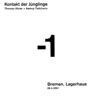 "Kontakt der Jünglinge" is the title of each CD in a series of collaborations between Tietchens and Köner. Like 1, -1 was recorded live at the Lagerhaus in Bremen. One day I listened to two Tietchens CDs in sequence: 7 Stücke followed by -1. At first, -1 sounded like a continuation of 7 Stücke, opening with sounds of objects being dragged/scraped along a surface. But -1 quickly builds up dense layers of sound, unlike the rather sparse 7 Stücke.The breezy drones provide a background to a variety of noise fromindustrial grinds to crystalline ringing sounds. About halfway throughthis 46-minute piece, we are even treated to some vocals! Okay, it'sjust someone reciting a numeral here and there, but it's all lovely andfun. I look forward to hearing something equally enticing when this duoperforms at the MUTEK festival in Montréal on Wednesday, May 28.(www.mutek.ca)
"Kontakt der Jünglinge" is the title of each CD in a series of collaborations between Tietchens and Köner. Like 1, -1 was recorded live at the Lagerhaus in Bremen. One day I listened to two Tietchens CDs in sequence: 7 Stücke followed by -1. At first, -1 sounded like a continuation of 7 Stücke, opening with sounds of objects being dragged/scraped along a surface. But -1 quickly builds up dense layers of sound, unlike the rather sparse 7 Stücke.The breezy drones provide a background to a variety of noise fromindustrial grinds to crystalline ringing sounds. About halfway throughthis 46-minute piece, we are even treated to some vocals! Okay, it'sjust someone reciting a numeral here and there, but it's all lovely andfun. I look forward to hearing something equally enticing when this duoperforms at the MUTEK festival in Montréal on Wednesday, May 28.(www.mutek.ca)
